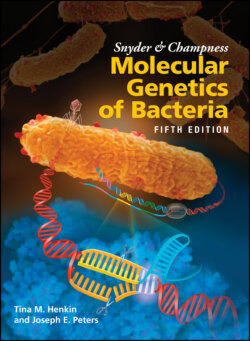Читать книгу Snyder and Champness Molecular Genetics of Bacteria - Tina M. Henkin - Страница 101
Timing of Initiation of Replication
ОглавлениеA new round of replication must be initiated each time the cell divides, or the amount of DNA in the cell would increase until the cells were stuffed full of it or decrease until no cell had a complete copy of the chromosome. Clearly, initiation of replication is exquisitely timed. In cells growing very rapidly, in which the next rounds of replication initiate before the last ones are completed, so that the cells contain a number of origins of replication, all of the origins in a cell “fire” simultaneously, indicating tight control.
A number of attempts have been made to correlate the timing of initiation of chromosome replication with other cellular parameters during the cell cycle. Most evidence from such attempts points to initiation of replication being tied to cell mass. After cells divide, their mass, or weight, continuously increases until they divide again. The initiation of chromosome replication occurs each time the cell achieves a certain mass, the initiation mass. If cells are growing faster in richer medium, they are larger and achieve the initiation mass sooner than do smaller, slower-growing cells, explaining why new rounds of chromosome replication occur before the termination of previous rounds in faster-growing cells but not in slower-growing cells. However, these experiments by themselves do not explain what it is about the cell mass that triggers initiation.
